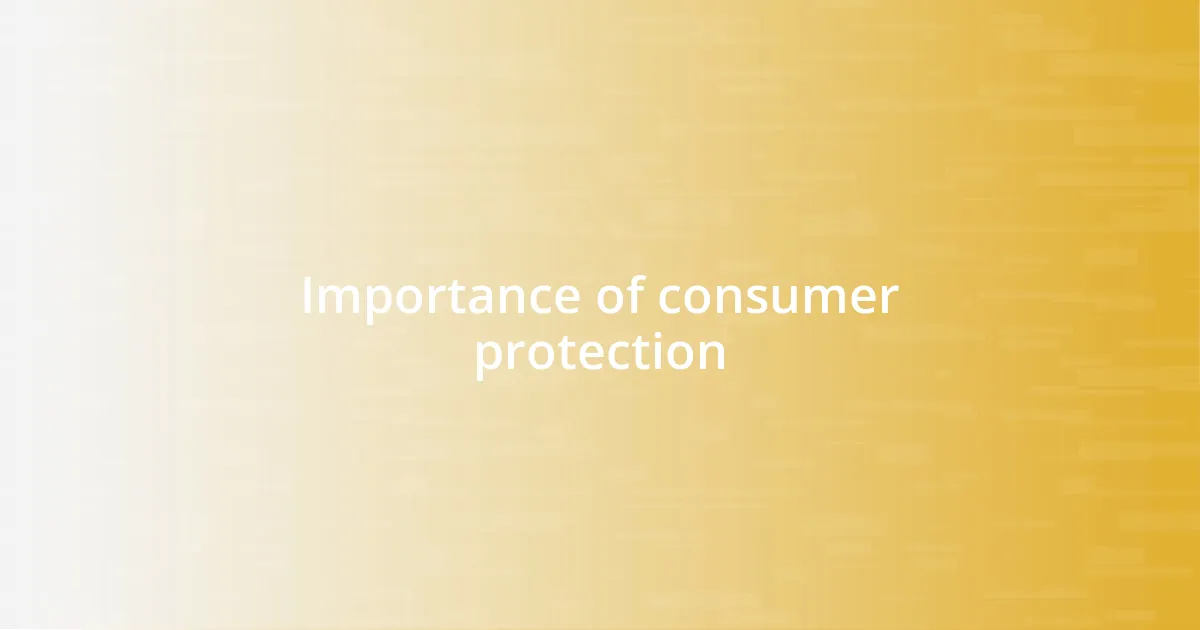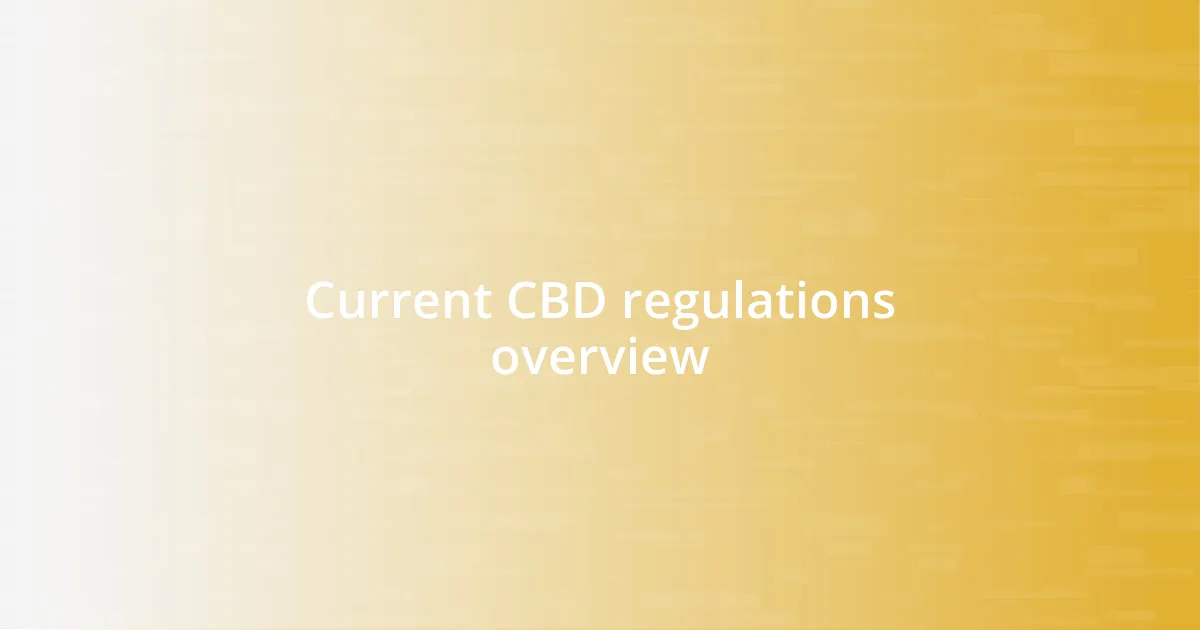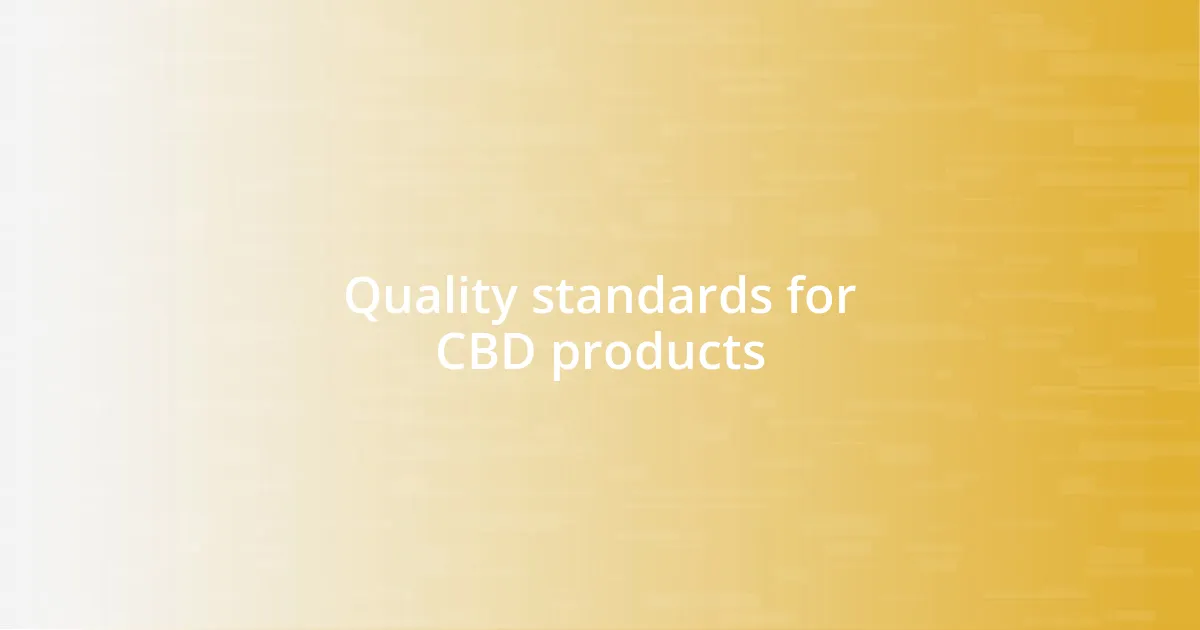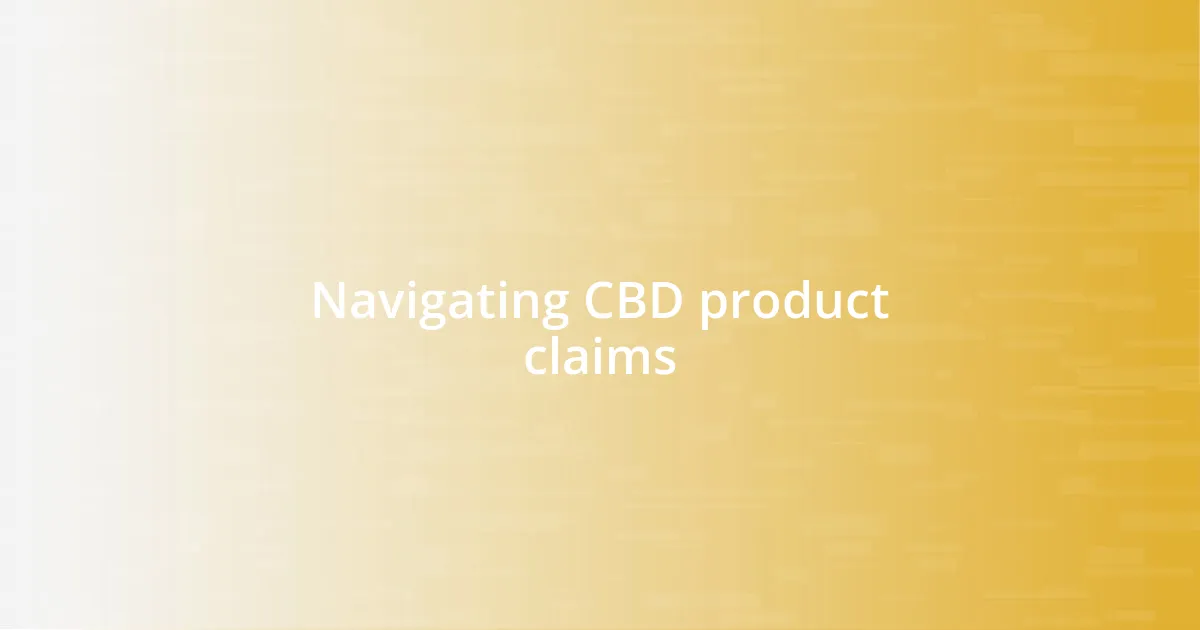Key takeaways:
- Consumers have the right to transparent information about CBD products, including ingredients, safety, and testing results.
- Consumer protection regulations enhance trust and encourage brands to adhere to quality standards, benefiting both customers and the industry.
- Advocacy and education are crucial for promoting consumer rights and accountability within the CBD market.
- It’s essential for consumers to critically evaluate product claims and seek verified information to make informed choices.

Understanding CBD consumer rights
Understanding CBD consumer rights is crucial for anyone navigating this fast-evolving market. As I’ve delved into the world of CBD, I marveled at how often consumers are left in the dark about what they truly deserve. Are we, as customers, aware of our rights regarding the quality and integrity of the products we buy?
One time, I bought a CBD oil that promised all-natural ingredients and third-party lab testing. It felt exhilarating at first, but then I was hit with doubt when I couldn’t find any lab results linked to my purchase. That experience made me realize the importance of knowing that consumers have the right to access transparent information about what they’re consuming. Quality assurance should be non-negotiable, right?
In essence, your rights as a CBD consumer should empower you to make informed choices. You deserve clarity about product origins, safety, and efficacy. When we advocate for our rights and demand accountability, we not only protect ourselves but also contribute to the overall integrity of the industry we’re part of. It makes me wonder: how many others out there are equally unaware of their rights? It’s time we all take a stand.

Importance of consumer protection
The importance of consumer protection in the CBD market cannot be understated. When consumers feel safe about their purchases, they’re more likely to trust brands and explore new products. Personally, I’ve had experiences where a lack of clear labeling left me wondering what I was actually buying. That feeling of uncertainty can be frustrating, and it only highlights how vital it is for consumer rights to ensure that products are well-documented and legitimate.
In my view, knowing that there are regulations in place to guard our interests makes a world of difference. Imagine going to a store and seeing products with detailed ingredient lists and safety certifications—wouldn’t that ease your mind? My interactions with brands that prioritize transparency and quality assurance have always been more satisfying. It’s as if they’re saying, “We respect your right to know.” That level of respect builds not just consumer confidence but also loyalty.
Lastly, consumer protection acts as a foundation for industry growth. When companies adhere to standards, it elevates the entire market. I’ve seen businesses flourish after embracing clear practices that benefit both them and their customers. It’s a win-win, and I strongly believe that when we support consumer rights, we’re fostering an environment where ethical practices can thrive.
| Aspect | Consumer Perspective |
|---|---|
| Transparency | Knowing the product’s contents helps consumers make informed choices. |
| Safety | Consumer rights ensure that products are safe and trustworthy. |
| Accountability | Brands that prioritize consumer protection show their commitment. |

Current CBD regulations overview
Current CBD regulations can be a bit of a maze, reflecting the fast-changing landscape of this industry. I’ve often felt overwhelmed by the patchwork of laws, especially with regulations varying by state or country. It’s fascinating to see how these rules aim to protect consumers while also supporting industry growth.
Here are some key points to consider regarding current CBD regulations:
- Legal Status: CBD derived from hemp with less than 0.3% THC is federally legal in the U.S., but state laws can differ significantly.
- Labeling Requirements: Many regions now mandate clear labeling, ensuring consumers know what’s in their CBD products.
- Testing Standards: Third-party lab testing is increasingly becoming a requirement, offering consumers a glimpse into product safety and effectiveness.
- Health Claims: Regulations limit the health claims that can be made about CBD products, keeping misleading information at bay.
Understanding these regulations helped me make better decisions. I once hesitated to buy a CBD topical because the label was vague and lacked testing information. Upon learning how to interpret these regulations, I felt empowered when I found a product that met all the right standards. It’s reassuring to know that when brands comply with these guidelines, I’m more likely to experience a beneficial and safe product.

Quality standards for CBD products
Quality standards play a crucial role in the CBD industry. From my perspective, I’ve noticed that products that undergo rigorous testing and quality control not only enhance consumer trust but also elevate the entire market. One particular experience stands out for me: I once tried a CBD oil that proudly displayed its lab results online. Knowing it had passed third-party testing gave me an added layer of reassurance—I felt like I wasn’t just making a purchase; I was investing in my wellbeing.
I’ve learned that quality standards aren’t just about meeting regulations—they also reflect a brand’s commitment to its customers. I remember a time when I hesitated to try a new CBD brand after hearing mixed reviews about their product integrity. It wasn’t until I saw their dedication to high-quality sourcing and transparent testing procedures that I finally took the plunge. Sharing this knowledge opened my eyes to how vital it is for consumers to demand that kind of accountability. After all, shouldn’t we expect brands to stand behind their products?
The impact of quality standards resonates deeply with me. When companies prioritize these measures, it creates a ripple effect. Just a while ago, I visited a local CBD shop that boasted certification for its products. The clarity in their practices made me feel confident enough to ask questions, and to my delight, the staff was eager to share their source materials and extraction methods. This kind of engagement not only solidified my trust but also prompted me to explore more options in their line. It reminded me that quality control is not just a box to tick; it’s an integral part of fostering a thriving community where consumers and brands work together for better experiences.

Rights to information and transparency
I’ve noticed that the right to accurate information is non-negotiable for CBD consumers like myself. When I went shopping for CBD gummies, I was pleasantly surprised by a brand that provided a detailed breakdown of their ingredients right on the packaging. This kind of transparency not only reassures me about what I’m putting into my body, but it also reflects the brand’s integrity. Have you ever read a label that just left you guessing? I certainly have, and it’s unsettling.
Consumers deserve more than just flashy marketing; we need clarity and honesty. For instance, during a recent trip to a wellness expo, I spoke to a vendor who openly discussed their sourcing and the specific testing their products underwent. Hearing their commitment made me not only trust their product more but also rethink how I evaluate other brands. Isn’t it refreshing to find companies that prioritize open communication over mere sales tactics?
Thinking back to my early CBD experiences, I remember how clueless I felt when choosing products. I recall a time when I purchased a tincture based solely on an Instagram ad, only to discover it lacked essential labeling and testing information. It was a learning moment! Now, I always seek out brands that provide transparent product information. I believe it’s our right as consumers to be informed, and such transparency ultimately empowers us to make better, safer choices.

Navigating CBD product claims
Navigating CBD product claims can feel daunting, especially with the flood of advertisements promising miracle results. I remember feeling completely overwhelmed the first time I tried to decipher the benefits of various CBD products. I stumbled upon a brand that boldly claimed their oil could cure anxiety and insomnia. Skepticism kicked in—how could they make such strong assertions without substantial evidence? This experience made it clear to me just how crucial it is for consumers to approach these claims with a critical eye.
What stands out to me in this context is the importance of researching third-party lab results. The moment I learned that not all CBD products are created equally, a world of empowerment opened up for me. I once discovered a product that claimed high potency but had no visible lab report. When I dug deeper, I found reputable brands that supported their claims with clear data. It was like lifting a veil; I felt more in control of my choices and my health.
I genuinely believe we owe it to ourselves to be discerning consumers in the CBD market. I’ve had those moments of regret when I rushed into a purchase based on slick marketing. Now, I ask myself before buying: Does this brand provide verifiable information? Are they transparent about their sourcing and testing? It transforms the shopping experience into a purposeful journey, rather than a gamble. After all, our health and wellness are too important to leave to chance.

Actions for consumer advocacy
Consumer advocacy in the CBD space is vital, and one of the most impactful actions is creating and joining advocacy groups dedicated to CBD education and reform. I remember attending a local meeting where passionate consumers shared their stories about poor experiences with misleading products. The energy in the room was palpable as we brainstormed ways to raise awareness about our shared concerns. Have you ever felt that surge of camaraderie when surrounded by like-minded individuals? It’s incredibly motivating.
Legal action, while less common, can sometimes drive significant changes in the industry. I recall a case where a group of consumers banded together to challenge a brand’s false health claims. Seeing the collective strength of voices was inspiring. When consumers stand united, we not only bring attention to our rights but also hold companies accountable for their practices. Isn’t it empowering to know we can demand better?
Educating fellow consumers is another essential step in advocacy. I often share insights with friends and family about what to look for when purchasing CBD products, especially about lab testing. Recently, a friend was confused about the difference between full-spectrum and isolate products. By explaining it to them, I realized how important it is to spread knowledge. When we empower each other with information, we create a more informed community that fosters trust and integrity in CBD consumption.














